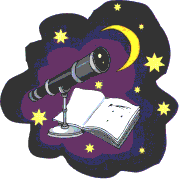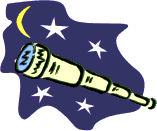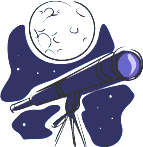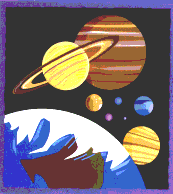Telescope in an English Garden
by John Hudson Tiner
His friend laughed when William Herschel told them he wanted to become
an astronomer. "You're a musician," they said. "Leave the planets to
the astronomers at Greenwich. They are the experts."
William Herschel lived at Bath, a resort town on the Avon River.
There he composed music and taught as many as 35 students a week. He
played the organ and led the choir of the famous Octagon Chapel.
William became conductor of the orchestra, but he kept his many other
duties, too.
 Each night before he went to sleep, William Herschel
read in bed with the covers pulled up to keep warm. Around him in a
tumbled heap were books on music, mathematics, optics, and astronomy.
Reading about astronomy did not satisfy him. William Herschel longed to
see the wonderful sights described in the books.
Each night before he went to sleep, William Herschel
read in bed with the covers pulled up to keep warm. Around him in a
tumbled heap were books on music, mathematics, optics, and astronomy.
Reading about astronomy did not satisfy him. William Herschel longed to
see the wonderful sights described in the books.
"You don't have a telescope," his friends reminded him. That was
true, too. A good telescope to view the planets cost more than William
Herschel could afford. Finally, he saved enough to rent a telescope for
three months. He viewed the skies with the telescope every clear night.
Neighbors saw a remarkable sight on nights when he conducted the
orchestra. During intermission of the concert he would race out the
back way and jump the hedge. He would run down the cobblestone street
to his house. Still dressed in his conductor's clothes, he would peer
into the telescope set up in his garden. After a few minutes, he would
hurry back to finish the concert.
 The little telescope revealed the dazzling white clouds
of Venus, the red surface of Mars, four of the moons in orbit around
Jupiter and the mysterious rings of Saturn. Three months passed
quickly. When the time came to return the telescope, his friends
thought he would be satisfied. "Now he will leave the planets to the
astronomers."
The little telescope revealed the dazzling white clouds
of Venus, the red surface of Mars, four of the moons in orbit around
Jupiter and the mysterious rings of Saturn. Three months passed
quickly. When the time came to return the telescope, his friends
thought he would be satisfied. "Now he will leave the planets to the
astronomers."
 William Herschel had not seen enough. He had to have a
telescope of his own. "If I can't buy one, then I'll make one," he
resolved. His sister Caroline read to him as he worked. She would pop
food into his mouth as he ground the mirrors. She took notes about the
construction and what he saw in the telescope. His first telescope was
not as good as he had hoped, but it was better than no telescope at
all. As soon as he finished the first one, he began on the second one.
Each telescope he finished taught him how to improve the next one.
William Herschel had not seen enough. He had to have a
telescope of his own. "If I can't buy one, then I'll make one," he
resolved. His sister Caroline read to him as he worked. She would pop
food into his mouth as he ground the mirrors. She took notes about the
construction and what he saw in the telescope. His first telescope was
not as good as he had hoped, but it was better than no telescope at
all. As soon as he finished the first one, he began on the second one.
Each telescope he finished taught him how to improve the next one.
What should he study with his telescope? Planets? No, professional
astronomers with their excellent telescopes studied the planets. That
left the stars. "I intend to examine all the stars I can see with my
telescope," he decided. As the stars drifted across his eyepiece, he
examined each one. Some stars were very bright. Others were extremely
dim. Some were deep red. Others were bright blue. Some changed in
brightness. Some came in pairs, in triplets, and in huge clusters of
many thousands.
 Herschel hunted out these strange sights. His sky survey
took four years. He discovered two thousand double stars and
twenty-five hundred star clusters. Most people thought it was a waste
of time. What of importance could Herschel discover that the
professional astronomers did not already know?
Herschel hunted out these strange sights. His sky survey
took four years. He discovered two thousand double stars and
twenty-five hundred star clusters. Most people thought it was a waste
of time. What of importance could Herschel discover that the
professional astronomers did not already know?
On Tuesday night, March 13, 1781, his sky survey took him into the
constellation of Taurus, the Bull. He found a faint spot of light. It
was a dim object of sixth magnitude. On a clear night away from bright
lights, a sixth magnitude star was just visible to a person with keen
eyesight. Unlike stars that always showed as pinpricks of light, this
object had a very definite disk--like a planet! The new object moved so
slowly that it had to orbit even farther from the sun than Saturn. To
be visible at such a great distance meant it had to be large. It was
nearly as large as Saturn. William Herschel had discovered a new planet.
William Herschel's discovery created a sensation in astronomy and in
all of science. Some scientists believed they had made all the
important discoveries. Nothing remained except to refine and improve on
the existing facts. William Herschel had given a dramatic example of
what waited to be uncovered. He had found a whole new world!
The new planet received the name Uranus. In Greek mythology, Uranus
was the father of Saturn. King George named William Herschel his Royal
Astronomer. The position came with a yearly salary. Now William
Herschel could devote his time to stargazing.
 William Herschel came back to his planet Uranus often.
In 1787, he discovered that two moons circled it. He named them Titania
and Oberon from characters in Shakespeare's play A Midsummer Night's
Dream.
William Herschel came back to his planet Uranus often.
In 1787, he discovered that two moons circled it. He named them Titania
and Oberon from characters in Shakespeare's play A Midsummer Night's
Dream.
In 1816, King George conferred upon William Herschel the title of
knight--Sir William Herschel. Despite the honor, William Herschel
remained a simple Christian, devout and humble. He was noted for his
kindness. He believed the heavens revealed the work of God. He once
said, "The astronomer who isn't devout must be insane."
Herschel died in 1819 at the age of 84. By coincidence, 84 years is
the time for Uranus to orbit the sun once. William Herschel is
remembered as the amateur astronomer who discovered a new planet with a
homemade telescope set up in his English garden.
Back to Contents
Does God Exist?, MayJun04.
 Each night before he went to sleep, William Herschel
read in bed with the covers pulled up to keep warm. Around him in a
tumbled heap were books on music, mathematics, optics, and astronomy.
Reading about astronomy did not satisfy him. William Herschel longed to
see the wonderful sights described in the books.
Each night before he went to sleep, William Herschel
read in bed with the covers pulled up to keep warm. Around him in a
tumbled heap were books on music, mathematics, optics, and astronomy.
Reading about astronomy did not satisfy him. William Herschel longed to
see the wonderful sights described in the books. The little telescope revealed the dazzling white clouds
of Venus, the red surface of Mars, four of the moons in orbit around
Jupiter and the mysterious rings of Saturn. Three months passed
quickly. When the time came to return the telescope, his friends
thought he would be satisfied. "Now he will leave the planets to the
astronomers."
The little telescope revealed the dazzling white clouds
of Venus, the red surface of Mars, four of the moons in orbit around
Jupiter and the mysterious rings of Saturn. Three months passed
quickly. When the time came to return the telescope, his friends
thought he would be satisfied. "Now he will leave the planets to the
astronomers." William Herschel had not seen enough. He had to have a
telescope of his own. "If I can't buy one, then I'll make one," he
resolved. His sister Caroline read to him as he worked. She would pop
food into his mouth as he ground the mirrors. She took notes about the
construction and what he saw in the telescope. His first telescope was
not as good as he had hoped, but it was better than no telescope at
all. As soon as he finished the first one, he began on the second one.
Each telescope he finished taught him how to improve the next one.
William Herschel had not seen enough. He had to have a
telescope of his own. "If I can't buy one, then I'll make one," he
resolved. His sister Caroline read to him as he worked. She would pop
food into his mouth as he ground the mirrors. She took notes about the
construction and what he saw in the telescope. His first telescope was
not as good as he had hoped, but it was better than no telescope at
all. As soon as he finished the first one, he began on the second one.
Each telescope he finished taught him how to improve the next one.  Herschel hunted out these strange sights. His sky survey
took four years. He discovered two thousand double stars and
twenty-five hundred star clusters. Most people thought it was a waste
of time. What of importance could Herschel discover that the
professional astronomers did not already know?
Herschel hunted out these strange sights. His sky survey
took four years. He discovered two thousand double stars and
twenty-five hundred star clusters. Most people thought it was a waste
of time. What of importance could Herschel discover that the
professional astronomers did not already know? William Herschel came back to his planet Uranus often.
In 1787, he discovered that two moons circled it. He named them Titania
and Oberon from characters in Shakespeare's play
William Herschel came back to his planet Uranus often.
In 1787, he discovered that two moons circled it. He named them Titania
and Oberon from characters in Shakespeare's play